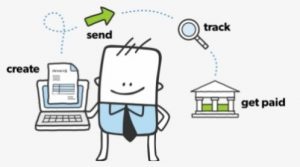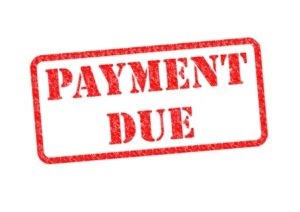Invoicing and payment – A lawyer’s guide

12 Aug 2020
When one thinks about how lawyers run their business, one of the first things that should come to mind is this – “bringing home the bacon”, earning the moolah and making coin. Which is fair enough. Running a legal practice isn’t easy. Not getting paid for doing it, will push most of us to despair and beyond. Accurate, timeous billing and invoicing goes a long way towards reducing risk, stress and increasing profits. Let’s explore this vital aspect of running a law firm and more importantly, how to actually go about doing it.
It is important to understand that a law firm is basically like any other business. Law firms try to maximise all revenues as they minimise their operation costs. Profit, as with any other business, is the main goal for a law firm. So, how do they go about accounting for it?
Now, this may not be the most exciting topic. But unless you have the invoicing end of your practice down, there won’t be a business to discuss. So it is worth going through a few rudimentary steps to ensure that you have this covered.
What does invoicing entail?
I think we can safely say that the actual performing of work as a skilled attorney is not only critical to your business but is also the core of it. But importantly, it is also what comes after the work – the recording of fees, creating an invoice and then the receiving of your fees – that actually keeps the legal practice afloat. The cash you bring into your business is one of the most important tools for growth. In fact, you can’t do much without it.
So let’s discuss….
The invoice
The law firm invoice is often a sore subject, both for attorney and client alike. Many of us have been in the position where a client has simply refused to pay on time (or simply can’t pay on time, especially nowadays). We have all rushed and stressed over trying to send out invoices and receive payment before we need to pay next month’s bills. It is an ongoing cycle. For every business.
And it all starts in the same place….
Your billing process begins with an invoice! Your invoice is one of the many ways you can communicate the value of your services to your clients. They should therefore always be clear and concise (clients should be able to easily read them), after all, when a person knows what they are being billed for (your time and the resultant work) they are more likely to pay. In theory.
Work in Progress
We have found that one of the easiest ways to ensure that you are paid regularly is to record the work you undertake, as a work in progress (“WIP”) immediately, and as and when the work is completed. Recording WIP in this manner assists lawyers by preventing unallocated costs i.e. missing out on certain tasks which could have been billed for – it is almost impossible to remember all attendances and perusals done a few weeks after the fact. You are also able to amend WIP narrations and amounts before you finalise the invoice, which is great if you still managed to miss out on a small fee here or there. But if you record WIP immediately, you save yourself the hassle of missing out on valuable billable fees. WIP can also be converted into an invoice, at any time of the month (therefore not having to wait for the month end statement run), whilst preventing VAT or Income Tax being incurred prematurely.
Interim Billing
Another good practice is to start “interim billing” where you invoice the client regularly during the life cycle of a matter. This ensures that clients pay each invoice as the matter progresses, under the assumption that they still require your services. An advantage of interim billing is that the final account is a smaller percentage of the total outstanding amount, avoiding the inevitable and so called “bill shock”. As we all know, if a client experiences bill shock, they invariably demand a discount – eating into the net profit margin! Of course it must be noted that it is not always possible to invoice a client during the life of the matter. For some matters, invoicing can only be done after the matter is finalised (such as matters taken on a contingency basis). In these cases, firms should at least try to invoice disbursements as this is a “hard” cost. And clients normally understand that disbursements need to be paid for straight away.
By not practicing interim billing or at least not recording your WIP immediately, you will experience an inevitable negative impact on your business. There is a direct correlation between the time invoices are sent out and the time it takes a client to make payment. The more time between the work being done and the invoices being sent out, the less likely you are to collect the funds. On time. To avoid situations like this, you should bring your statement run forward. For example, if you are invoicing clients at month end, you should bring your month end run forward, so that the client receives the invoice well before their own month end. Then, if payment is done within 30 days, you will probably be paid at the end of the following month.
Automated billing software
Often the time it takes to complete the invoicing process (which can sometimes take days), especially if done manually, is valuable time wasted that could have been spent on more important tasks, like actual billable hours. So, why not use legal billing software to automate the process? Take the time to investigate various billing /invoicing systems. Often they are marketing as practice management systems or matter management systems but the best ones are those that are incorporated into proper Legal accounting and management systems such as AJS.
Systems such as AJS offer completely integrated billing, legal accounting and practice management modules within their Express and Enterprise solutions and the time saved in manual processing of invoices alone covers the cost. It’s really worthwhile looking into.
Discounting fees
The dreaded discounting question.
There are times when prospective clients will ask for (and sometimes have the audacity to demand) a discount. Often they claim that they cannot afford a lawyer, whilst sitting there with their Luis Vuitton handbag and Louboutin shoes. Or they tell you that the lawyer across town is charging less (usually without proof). Or they actually question the value of your work by claiming that all you are doing is “filling out paperwork” or they have a “slam-dunk” case (which it hardly ever is).
So here are some suggestions on how to deal with clients who demand discounts for your services –
- An obvious one, try talk them out of it: most people hire attorneys only once or twice, usually through referrals. They therefore may not truly appreciate what an attorney actually does during the day. It’s not all “Suits” and Harvey Specter. Unfortunately. So, explain the process, what is actually involved, the time it may take and what would be required of you, try sharing some war stories, particularly any difficulties you have encountered along the way. Once the client understands the complexity of the work involved and the advantages of retaining you and your legal expertise, they are more likely to pay your asking price;
- Any discount should be minimal – saving money, especially at the moment, is crucial for most people and businesses navigating their way in this “new normal” we find ourselves in. This requires empathy. Often budget focused, they disregard quality of the work. Which will sadly affect them down the line. But it’s important that you don’t put yourself in a situation where you spend a lot of time on a low-paying case. You are also trying to make ends meet during difficult times. So do not start the negotiations off by offering a large discount. The discount should be a small percentage, at most, and
- The client should pay in full as soon as possible in exchange for the discount – in fee negotiations, both parties have to make concessions. So if you are going to give the client a discount, the client should agree to pay in full immediately. This does offer the law firm a positive outcome by providing the cash payment upfront. The law firm practice will have renewed impetus allowing for payment of the law firms own accounts and vendors sooner rather than later. If you have to enter into a payment plan, it should not last longer than a few months. Full payment will minimise the chances of fee disputes and clients asking for additional discounts in the future.
While there is nothing wrong with negotiating, most attorneys know the value of their time and expertise. But if a client insists on a discount, only give it to those who are willing to make concessions. After all a win-win requires a little quid pro quo.
What about unpaid invoices?
Regardless of the size of your legal practice, unpaid invoices aren’t just an inconvenience. They can impact everything – if cash flow is interrupted you will not have the money to keep your business operational. This situation would mean you can’t pay employees, suppliers, or vendors. As a result, you yourself could be slapped with late fees whilst at the same time damaging your reputation by being considered a delinquent payer. Not ideal for a legal practice that prides itself on a stellar reputation….
But fear not, here are some suggestions to follow if you find yourself in this situation –
- Make sure you followed the correct accounting procedure and then, follow-up politely. – first and foremost, make sure that you did, in fact, send the invoice out correctly. Were payment terms clear? What is the amount due? Did you send it to the right person? Is your address correct? It would be extremely unfavorable to lose your cool with a client only to find out that it was your fault all along. Also keep in mind that sometimes unpaid invoices slip through the cracks. A client may be out-of-town or dealing with an emergency. Before getting angry, send a polite follow up email to check in. More often than not a brief, “Just checking in,” email can help get the invoice paid. So, always ensure that despite the overdue invoice you focus on retaining a good working relationship with the client going forward, especially if the unpaid invoice was just an oversight;
- Give discounts and charge a penalty – it’s an unpleasant situation, with implications for your cash flow and customer service. But there are two options – you can offer a discount for early payments, resulting in clients being encouraged to pay ahead of the due date. It’s not uncommon to offer a 5% or 10% discount on the total invoice amount if an invoice is paid in full within 10 days. Unfortunately, not everyone is motivated by incentives. Instead, they may be motivated if their invoice has a penalty fee. You can charge a late fee or interest, but make sure the original contract signed by the client clearly states any fees or interest charges on overdue accounts. Remember the Consumer Protection Act 68 of 2008 states that “A consumer must receive a quote or breakdown of his/her financial obligations before entering into an agreement”. Therefore penalties for late payments must be covered in any agreement entered into with your client. Make sure the section is easy to read and clearly written. Keep your terms simple and brief, and
- What if you followed the accounting procedure correctly, the polite follow-up didn’t work and the discount and penalty had no effect? Is the collection procedure, arbitration, mediation or court on the cards? Remember business is business. When you have invoices that are over 90 days past due and there is no payment in sight, you may be left with no other option. But be aware that this should not be your immediate point of call. Before getting involved with formal collections, contact someone else at the office, such as the accounting manager. See if you cannot talk sense into them. Also, what if the client wants to pay, but is having cash flow problems (which is becoming more and more commonplace)? Consider offering a short, three-to-six-month payment plan. It could be a risky move if they’re going to go bankrupt, but it’s worth a shot. You have options. Remember your time and effort in recovering fees are also an important consideration. So weigh up the pros and cons carefully.
Prevention is better than a cure
If you want to prevent the headache and stress of unpaid invoices in the first place, make sure that you thoroughly research new clients to make sure that they are legit and don’t have any prior complaints. Especially if it is coming from an online referral or online request for information. Always ensure that you have a signed contract, keep detailed records, and if possible, ask for a payment upfront (especially for new clients).
Make the payment process as convenient as possible, set-up recurring invoices, and work on establishing strong client relationships. Most importantly, know when to stop chasing a late payment. It’s not worth the time, energy and money to hunt down a R3000 invoice.
To conclude, Sir Winston Churchill said it perfectly – “Success is not final; failure is not fatal: it is the courage to continue that counts”.
Your business will go through many ups and downs. Especially now. Be sure to celebrate the successes and manage the failures. It is all cyclical but once mastered, managing the invoicing and collection of payments for your legal practice should be a piece of cake.
If you have any questions about automating your legal accounting process such as the invoicing and management of your accounts, contact AJS today to see how they can best assist you.
See also:
- Legal accounting and practice management
- Law firm finance 101 – Tools to limit interest expense on third party funding
- Unreasonable and unfair increased costs imposed on legal practitioners by regulatory bodies
- Latest development from AJS: Customized cost calculators for your law firm’s website
- Cloud hosting – Managed or traditional?
- Uncovering hidden assets – Can online tools make asset discovery easier?









